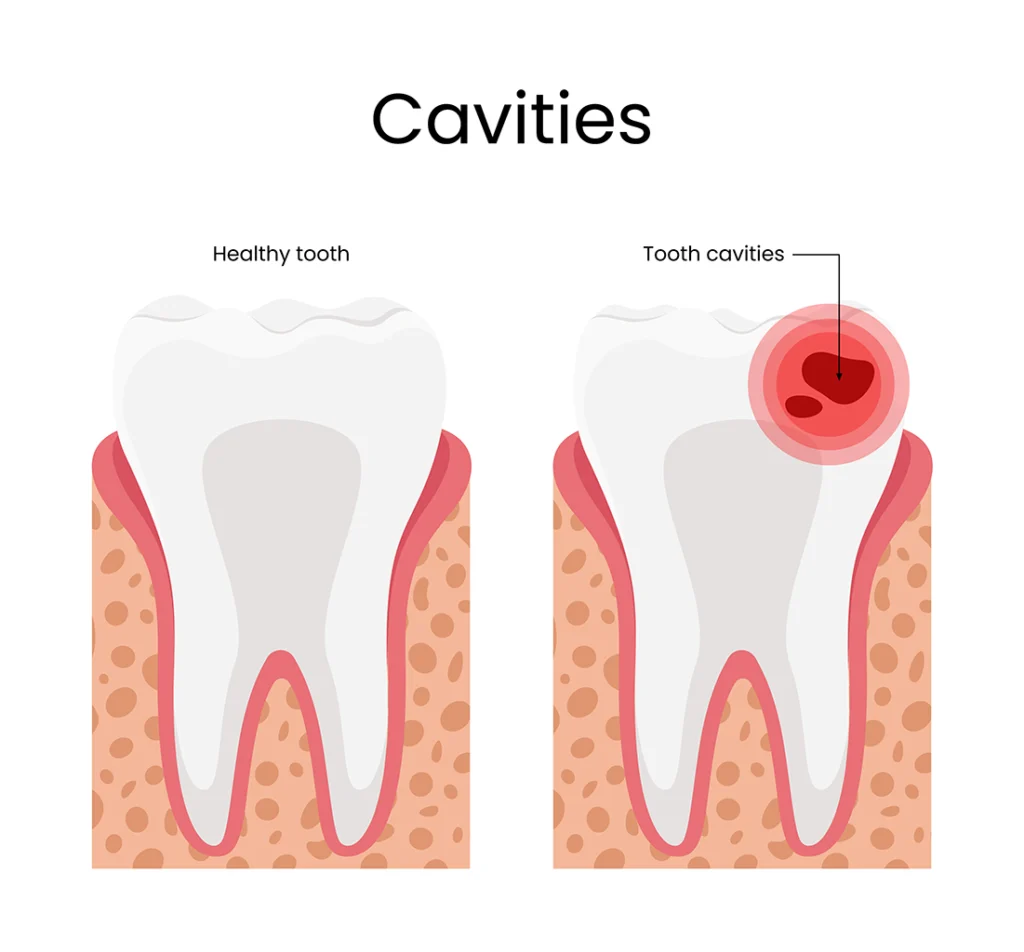Cavities, also known as dental caries or tooth decay, are one of the most common oral health issues people face. They can affect individuals of all ages and, if left untreated, can lead to significant discomfort and more severe dental problems. This article will explore what cavities are, how they form, and what you can do to prevent and treat them. We’ll also provide answers to common questions like are cavities painful, how do I fix my cavities, and what foods prevent cavities, all with insights from Legacy Smiles.
What Are Cavities?
Cavities are areas of tooth decay that result in small holes or openings in the hard surface of your teeth. They occur when the enamel, the outermost layer of the tooth, is weakened and broken down by acid produced by bacteria in the mouth. Over time, this process creates permanent damage that, if not addressed, can extend deeper into the tooth, affecting the dentin (the layer beneath the enamel) and even reaching the tooth’s pulp, which contains nerves and blood vessels.
Cavities can develop on any part of a tooth, including the chewing surfaces, between teeth, and near the gumline. Once a cavity forms, it requires treatment to prevent further decay and potential complications such as infection or tooth loss.

How Do Cavities Form?
Cavities form through a process called demineralization, which is the breakdown of tooth enamel. This occurs when bacteria in your mouth feed on sugars and starches from the food you eat, producing acids as a byproduct. These acids attack the enamel, gradually dissolving it and creating a cavity. The formation of cavities follows several stages:
1. Plaque Formation
Plaque is a sticky, colorless film of bacteria that constantly forms on your teeth. When you consume foods and beverages containing sugars or carbohydrates, the bacteria in plaque break down these substances, producing acids. Plaque also tends to build up on teeth over time, especially in hard-to-reach areas like the back molars and between teeth.
2. Acid Attacks on Enamel
The acids produced by bacteria in plaque start to erode the enamel by removing essential minerals such as calcium and phosphate. This demineralization process weakens the enamel, leaving it vulnerable to further damage.
3. Enamel Breakdown
If the acid attacks are persistent and frequent, the enamel begins to break down, leading to the formation of small holes or cavities. At this stage, the decay is limited to the enamel and may not cause any noticeable symptoms.
4. Dentin Involvement
As the cavity progresses, it can reach the dentin, which is softer than enamel and more susceptible to decay. At this point, the cavity may cause sensitivity, particularly to hot, cold, or sweet foods and drinks.
5. Pulp Involvement
If left untreated, the cavity can eventually reach the pulp, where the tooth’s nerves and blood vessels are located. At this stage, the decay can cause significant pain and may require more advanced treatments such as root canal therapy or even tooth extraction.
Are Cavities Painful?
The answer depends on the stage of the cavity and its location in the tooth. Early-stage cavities that are confined to the enamel may not cause any pain or discomfort, which is why regular dental checkups are crucial for detecting cavities before they become problematic.
As the cavity progresses and reaches the dentin or pulp, you may experience increased tooth sensitivity or pain. This discomfort is often triggered by eating or drinking something hot, cold, or sugary. In more advanced cases, cavities can cause severe pain, especially if the decay has caused an infection or abscess in the tooth.
If you suspect you have a cavity and are experiencing pain, it’s important to schedule an appointment with Legacy Smiles to assess the situation and receive appropriate treatment.
How Do I Fix My Cavities?
The good news is that cavities are treatable, and there are several options depending on the severity of the decay.
Dental Fillings
For small to moderate cavities, a dental filling is the most common treatment option. During this procedure, the dentist will remove the decayed portion of the tooth and fill the space with a material such as composite resin, porcelain, or amalgam (a mixture of metals). Fillings restore the tooth’s structure and function, preventing further decay.
Dental Crowns
If the cavity is more extensive and has damaged a large portion of the tooth, a dental crown may be needed. A crown is a custom-made cap that fits over the entire tooth, restoring its shape, strength, and appearance. Crowns are typically made of porcelain, metal, or a combination of both and are durable enough to protect the tooth for many years.
Root Canal Therapy
When a cavity reaches the pulp of the tooth, causing infection or severe pain, a root canal may be necessary. During this procedure, the dentist removes the infected pulp, cleans the inside of the tooth, and seals it with a filling. In many cases, a crown is placed on the tooth after the root canal to provide additional protection.
Tooth Extraction
In extreme cases where the cavity has severely damaged the tooth and it cannot be saved, extraction may be the only option. After the tooth is removed, our dentist will discuss tooth replacement options, such as dental implants or bridges, to restore your smile and maintain oral function.
At Legacy Smiles, our team of dental professionals will assess your cavities and recommend the best treatment options based on your specific needs.
What Foods Prevent Cavities?
Maintaining a healthy diet plays a key role in preventing cavities. Here are some of the best options to include in your daily diet:
Dairy Products
Milk, cheese, and yogurt are rich in calcium and phosphate, which help strengthen tooth enamel and neutralize acids produced by bacteria. Cheese, in particular, stimulates saliva production, which naturally cleanses the mouth and helps protect teeth from decay.
Fibrous Fruits and Vegetables
Fruits and vegetables like apples, carrots, and celery are not only nutritious but also stimulate saliva production and help clean the surfaces of your teeth as you chew. The natural fibers in these foods act like a gentle scrub for your teeth, helping to remove plaque and food particles.
Nuts and Seeds
Nuts and seeds, especially almonds, are high in calcium and protein, which help support strong teeth and overall oral health. They are also low in sugar, making them a tooth-friendly snack option.
Green and Black Teas
Both green and black teas contain compounds called polyphenols, which help reduce the growth of harmful bacteria in the mouth. Drinking tea can help neutralize the acids produced by bacteria, preventing them from attacking your tooth enamel.
Water
Water is essential for maintaining good oral health. Drinking water throughout the day helps wash away food particles, bacteria, and acids, keeping your mouth clean and reducing the risk of cavities. Fluoridated water, in particular, strengthens enamel and helps prevent tooth decay.
How to Prevent Cavities
In addition to eating a tooth-friendly diet, there are several other steps you can take to prevent cavities and maintain a healthy smile:
- Brush your teeth twice a day with fluoride toothpaste.
- Floss daily to remove plaque and food particles from between your teeth.
- Use an antimicrobial mouthwash to reduce bacteria in your mouth.
- Visit Dr. Kolten Astle at Legacy Smiles regularly for checkups and professional cleanings.
- Limit sugary and acidic foods and beverages, such as candy, soda, and fruit juices.
By following these tips, you can significantly reduce your risk of developing cavities and keep your teeth strong and healthy.
Conclusion
Cavities are a common dental issue that can be easily prevented with proper oral hygiene and a healthy diet. If you’re concerned about cavities or have been experiencing tooth pain, it’s important to schedule a dental appointment to address the problem before it worsens. The team at Legacy Smiles is here to provide the care and guidance you need to maintain optimal oral health.
By understanding the causes of cavities and making informed choices about your oral health, you can enjoy a healthy, cavity-free smile for years to come. Reach out to Legacy Smiles today for more information or to schedule your next appointment!

